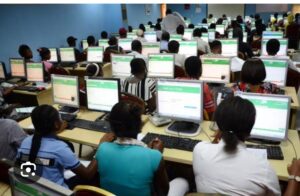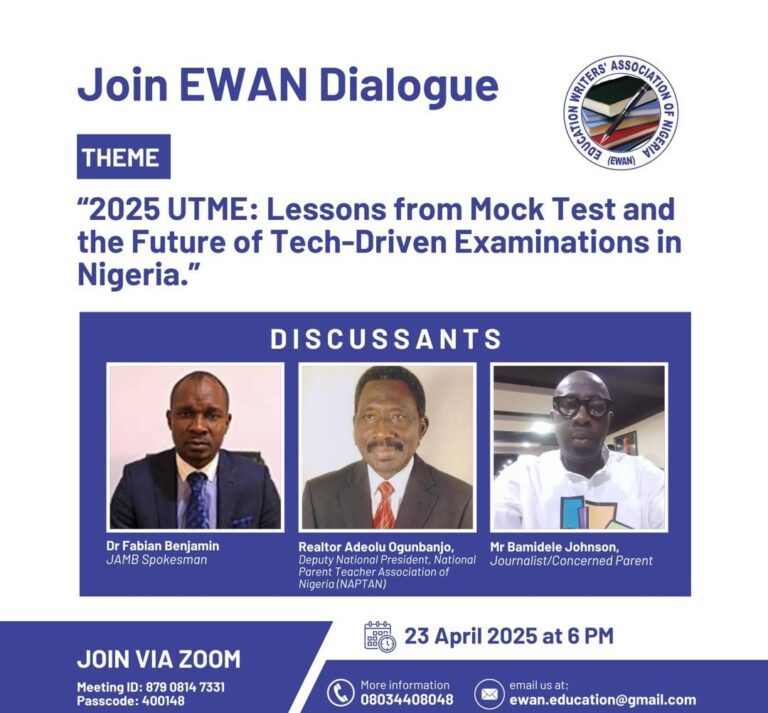The Joint Admissions and Matriculation Board (JAMB) has addressed key concerns of candidates, parents and other stakeholders, especially the possible clash of timetables as both the Unified Tertiary Matriculation Examination (UTME) and the West African Senior School Certificate Examination (WASSCE) commence on Thursday (today).
While UTME is conducted by JAMB, WASSCE is conducted by the West African Examinations Council (WAEC). Both examinations are mandatory for candidates seeking admission to tertiary institutions in Nigeria.
However, both examination bodies have fixed Thursday, 24 April, for the commencement of their examinations. The development may create a possible clash of schedules for some candidates, and this became a subject of discussion on Wednesday evening during a dialogue session organised by the Education Writers’ Association of Nigeria (EWAN).
EWAN is a network of journalists dedicated to reporting education across Nigeria’s print, broadcast, and digital platforms.
The event, themed “Lessons from the Mock Test and the Future of Tech-Driven Examinations in Nigeria,” focused on assessing the board’s preparedness in the wake of several complaints that trailed the mock exam.
JAMB expresses surprise
Ahead of the commencement of UTME, EWAN featured JAMB’s Public Communication Advisor, Fabian Benjamin, to address some of the concerns raised by stakeholders, especially over the glitches experienced by candidates during the conduct of its mock tests.
Speaking on the possible clashes of timetables for some candidates who may be participating in the two examinations, Mr Benjamin said he was surprised to note that WASSCE would be commencing on Thursday.
He said to avoid such a crisis, the various examination bodies in Nigeria had always harmonised their calendars, and that one of the reasons for commencing UTME on Thursday instead of Friday earlier announced, was to create room for other examinations.
“I would be surprised if WASSCE would be commencing tomorrow. You may have to check again. We have always harmonised and all these were considered before we chose this date. We had announced as early as December last year that JAMB would commence in April, so I’m surprised to hear that WASSCE too is kicking off on the same day,” he said.
Mr Benjamin, however, noted that maybe the WASSCE subjects scheduled for the same period as UTME may not be taken by candidates who are sitting UTME.
“WAEC may have conducted its findings to be sure of no possible clashes. Most of the subjects they begin with are subjects with a very few candidates,” he added.
The JAMB official, however, urged stakeholders, including journalists, to be on the lookout for possible clashes so that the examination bodies could jointly address them.
Meanwhile, efforts to get the reaction of the Acting Head of the Public Affairs unit of WAEC, Moyosola Adesina, were unsuccessful as she neither picked calls to her mobile line nor replied to a short message as of the time of filing this report on Thursday morning.
2 million candidates, 887 centres

According to Mr Benjamin, over 2 million registered candidates will sit the examination in 887 computer-based test centres across the nation from 24 to 30 April.
He said more than 10,000 officials have been deployed to be physically present across the 887 nationwide, with a minimum of 10 in each of the centres.
“We have more than 10,000 officials. Each centre has 10 physical officials to monitor the exercise, while we also have those who would just be roving.”
Mock-UTME
The 2025 mock UTME was conducted on 10 April. Of the 200,113 candidates that registered for the mock exam, only 126,181 candidates successfully sat the exam, while 73,844 candidates were absent, and 88 others failed the biometric verification screening.
Mr Benjamin described mock UTME as a trial hands-on test for the candidates and a test of the board’s equipment.
During the mock exercise, candidates encountered various challenges ranging from long travel distances to assigned centres, delays in commencement, and technical faults that prevented some from taking the exam altogether.
These setbacks sparked outrage among candidates and their parents, who demanded accountability and sought reassurance ahead of the UTME.
A concerned parent and journalist who shared his experience during the dialogue, Bamidele Johnson, criticised the board for delays, allocation to distant centres and other glitches experienced, which he said led to the inability of some candidates to sit the mock exam.
He said: “My colleague took his child to the allocated centre at 6:30 a.m. but the candidate could not write the exams, instead they left in anger after more than 10 hours of waiting.
“If your systems are precise, how will a candidate choose Ifo, for instance, and end up in Ewekoro? Even those who got favourable postings, why was it still not possible for them to write the mock exams?” Mr Johnson queried.
He said: “What you are doing is that you are conditioning these children to think that their country doesn’t care about them.”
JAMB responds
Responding to the concerns, JAMB’s spokesperson explained that the mock examination was never intended to be flawless, but rather to help identify and address potential challenges before the actual UTME.
While he apologised to those who could not sit the mock exam as a result of the hitches encountered, he assured that the agency has taken the feedback with a view to ensuring improvement.
“Some centres overestimated their capacity, but the mock helped us identify such weaknesses. It’s a costly venture, but we have taken this as valuable feedback and will do better,” he said.
Mr Benjamin clarified that JAMB does not allocate candidates outside their selected examination towns.
He explained: “In registering for UTME, centres that candidates are sent to are tied to the examination town they have chosen. The process is designed in a way that candidates are only allocated to centres clustered around selected exam towns,” he said.
‘Why we bar parents from centres’
Mr Johnson criticised JAMB for restricting parents from accompanying their wards to the examination centres, citing concerns about the timing of the exams, long distances, and the insecurity ravaging the nation
Mr Benjamin however maintained that the directive was a crowd-control measure following a recent incident where guardians/parents allegedly attempted to force their way into an examination venue, causing unnecessary tension.
“What we mean is that parents should not be found close to the exam centres. You can accompany them to the venue, but do not follow them to the centre.”
Commenting on the early hours scheduled for the exams, Mr Benjamin said the morning batch actually begins at 8 a.m., but certain security checks, screening, and verification must be completed before the exam can commence.
“We expect candidates to be seated and settled for at least 30 minutes or one hour before the commencement of the exam,” he noted.
Plan for persons with disabilities
As part of its support efforts, JAMB said it provides free registration forms to persons living with disabilities and also transports them to their centres, especially those who live far from the venues.
He disclosed that exams for PWD are administered by a group of academics chaired by Peter Okebukola, a professor.
“After the exam, there is a desk officer who follows up and ensures that they get admission.”
Who gets admission?
The JAMB spokesperson has noted that no candidate will be offered admission until they have provided their O’ level result.
According to him, all candidates who registered for UTME using ‘awaiting result’ will not be offered admission until they provide their O’level within the acceptable time frame.
“The term ‘awaiting result’ only allows candidates to sit the exam but will not be considered for admission until your O’level result is provided,” he said.
EWAN speaks
In his opening remark, the chairman of EWAN, Mojeed Alabi, emphasised the importance of the dialogue, describing UTME as a crucial entrance exam that determines the fate of millions of young Nigerians in their pursuit of tertiary education.
Mr Alabi and the Chairperson of the Dialogue Committee, Iyabo Lawal, assured participants that EWAN would continue to bring educational issues of public importance to the fore as they arise.


